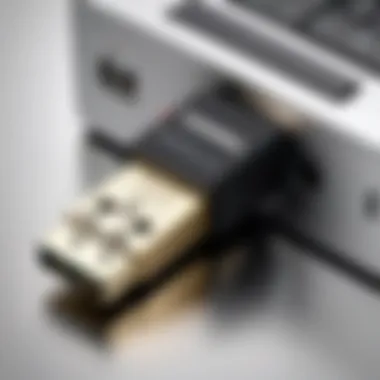In-Depth Review of Toshiba USB Devices and Their Applications


Intro
Toshiba has made quite a name for itself in the world of USB devices, merging innovation with reliability. With the increasing demand for portable storage solutions, it’s essential to take a closer look at what these devices offer. This article seeks to explore the intricacies of Toshiba USB products, aiming to inform and educate tech enthusiasts, casual consumers, and gamers alike.
In the following sections, we will dissect the functionality of Toshiba USB devices, shedding light on key features, technical specifications, and how they stack up against the competition. We will also delve into performance metrics, real-world applications, and potential drawbacks that users may face. As we navigate the landscape of USB technology, we aim to provide insights that support consumers in making educated choices about their storage needs.
Preface to Toshiba USB Technology
Toshiba is a name deeply connected with innovation and technology, particularly in the realm of USB devices. In this section, we delve into the pivotal role Toshiba plays in expanding and enhancing USB technology. A clear understanding of this technology is crucial for both everyday users and tech aficionados, as it streamlines data management and drives modern computing.
Overview of USB Technology
USB, or Universal Serial Bus, is a standard that has revolutionized how we connect devices and transfer data. Imagine it as the universal key that allows various devices—from your beloved gaming console to that fancy printer—to talk to each other. The simplicity of USB, both in design and function, makes it an essential part of our digital lives.
Historically, USB technology has evolved through several iterations, each offering significant improvements. With versions like USB 2.0 trickling in at a max speed of about 480 Mbps, it laid the groundwork. But it was USB 3.0 that truly transformed the game, providing speeds up to 5 Gbps. This leap in data transfer capabilities translated into faster file transfers, quicker backups, and overall smoother user experiences.
For ordinary users, the benefits of USB technology are clear. The ability to plug-and-play without fuss, the compact nature of USB drives, and their increasing storage capacities make them indispensable tools in data management. Whether you're transferring photographs from a digital camera or backing up essential work documents, USB technology makes it all hassle-free.
The Role of Toshiba in the USB Market
Toshiba, a veteran in the computer and electronics field, has carved out a niche in the USB device market. The company's commitment to quality and performance sets it apart from competitors. From USB flash drives to external hard drives, Toshiba has consistently delivered products that blend functionality and reliability.
One notable feature of Toshiba’s USB devices is their focus on durability. Many models are designed to withstand shocks and drops, which is something that cannot be said for all brands. This durability factor is particularly appealing to users in dynamic environments, like those in creative fields or remote jobs, where the data on a USB stick often contains critical work.
Moreover, Toshiba’s efforts in innovation don't go unnoticed. With features like the USB-C interface and improved data transfer rates, Toshiba keeps pushing the boundaries of what's possible. This adaptability not only showcases Toshiba's relevance in the market but also highlights its dedication to meeting the needs of diverse consumers.
Toshiba’s advancements in USB technology reflect an understanding of evolving consumer demands, combining reliability and performance in its products.
In summary, the importance of understanding Toshiba's role in the USB market cannot be overstated. As users seek out storage solutions, knowing what Toshiba brings to the table helps in making informed decisions. In the upcoming sections, we'll explore Toshiba's various USB devices, their specifications, performance metrics, and real-world applications.
Toshiba USB Devices: Types and Specifications
When it comes to Toshiba USB devices, understanding the diverse types and their specifications is crucial for anyone looking to find the right fit. These devices may seem similar at first glance, but they cater to varying needs, features, and environments. The right choice can enhance productivity, elevate user experience, and often saves one from technology-related headaches.
USB Flash Drives
USB flash drives from Toshiba are a cornerstone for portable storage needs. Compact and lightweight, they offer convenience for daily tasks. Their ease of use distinguishes them in the storage market. Here are some specifications to consider:
- Capacity: From 8GB to 1TB, users can select based on their requirements. Casual users might find the 16GB or 32GB models sufficient for documents and photos, while professionals looking to store large media files may opt for higher capacities.
- Speed Ratings: Toshiba has made strides with their flash drives, integrating USB 3.0 technology in many models. This translates to faster data transfer rates compared to older USB 2.0 variants. For instance, while a USB 2.0 flash drive may clock in at around 480 Mbps, USB 3.0 drives can push it north of 5 Gbps.
- Durability: Many Toshiba flash drives come with ruggedized exteriors designed to withstand daily wear and tear. This is particularly beneficial for those on the go, as they can handle bumps and drops without much fuss.
In essence, Toshiba flash drives effectively blend form and function, making them suitable for both casual users and professionals alike.
External Hard Drives
Toshiba’s external hard drives stand tall in the competitive landscape, serving both tech enthusiasts and everyday users with distinctive features. They're generally used for large-scale data storage, often tipping the scales in capacities ranging from 500GB to several terabytes. Here’s what sets them apart:
- Robust Storage Solutions: Unlike flash drives, these external hard drives can hold vast amounts of data. Thus, they are ideal for backup purposes, archiving large files, and storing comprehensive collections of multimedia—including videos, music, and photographs.
- Connectivity Options: Most of Toshiba’s external hard drives offer a range of connection options—USB 3.0, USB-C, and in some instances, Thunderbolt. This versatility helps ensure compatibility with various devices, from high-end laptops to standard desktops.
- Data Security Features: Some models come equipped with password protection encryptions. This is crucial for users concerned about data security and privacy, and it offers peace of mind that sensitive information can remain confidential even if the drive is lost or stolen.
External hard drives by Toshiba are valuable assets, especially for individuals or businesses that prioritize data security and storage efficiency.


USB Hubs
Toshiba has not merely confined itself to standalone devices; its USB hubs enhance connectivity and expand functionality. These hubs are increasingly essential in a world transitioning towards multiple devices connecting seamlessly. Here are some of the key details:
- Port Variety: Toshiba USB hubs typically include a mix of USB 3.0 and USB-C ports, allowing users to connect various devices, from chargers to external monitors.
- Compact Design: Their sleek, portable nature makes them ideal for travel, with some models easily fitting into a laptop bag. This construction is a boon for users who find themselves juggling multiple connections while on the move.
- Power Supply: Many Toshiba hubs come with an external power adapter that provides additional wattage for charging devices simultaneously while connecting them.
Overall, these USB hubs serve as vital tools that help bridge the gap between multiple devices, ensuring that productivity never comes to a standstill.
"Having the right USB device for your needs can redefine how you manage and store data. With a range of options from Toshiba, you can find exactly what you're looking for."
By understanding the different types of Toshiba USB devices and their specifications, consumers can make informed choices that not only meet their current needs but also accommodate future demands.
Performance Metrics of Toshiba USB Devices
In evaluating USB devices, performance metrics are paramount. These metrics are the yardsticks that determine how well a device functions in day-to-day tasks, from simple file transfers to handling large datasets. Consequently, for those contemplating an investment in Toshiba USB devices, understanding these parameters is essential. They directly impact user experience, influencing decisions based on speed, storage capacity, and reliability.
Data Transfer Speeds
USB 2. vs. USB 3.
The rivalry between USB 2.0 and USB 3.0 is a cornerstone of the USB technology landscape. USB 2.0, released back in 2000, boasts a theoretical maximum speed of 480 Mbps. However, in practice, users often see lower speeds due to various factors, such as device limitations or file size. On the opposite side, USB 3.0, which came into prominence roughly a decade later, can reach up to 5 Gbps—over ten times faster.
One can say that USB 3.0 is the golden standard in today's world. It's not just about speed; it's about efficiency. The architecture of USB 3.0 includes more pins, allowing for simultaneous data transfer, thus promoting a much more streamlined experience. For consumers, this means smoother operation when dealing with large files, whether it's a high-definition video or a substantial database backup.
"Speed and efficiency in USB technology can make all the difference between a seamless experience and frustrating delays."
Yet, it's worth noting that backward compatibility is a critical element here. USB 3.0 ports will still accept USB 2.0 devices, although the speed will default to the slower option. This compatibility means you don’t have to toss out older devices, which is a plus for many users.
Real-World Performance Comparisons
Real-world performance comparisons often shed light on speed metrics that theoretical data cannot capture. For instance, direct assessments show that while USB 3.0 might wholly outclass USB 2.0 in maximum speed, the difference in everyday usage might not be drastic under certain conditions. Small files are transferred rapidly on both; the latency becomes evident when moving larger chunks of data—this is where USB 3.0 shines.
In field tests carried out with Toshiba units, variations emerged based on the device's nature and the tasks performed. For example, transferring a 1GB movie file can take under 40 seconds on a USB 3.0 drive, while the same task on a USB 2.0 drive may stretch to several minutes. Such real-world performance metrics provide invaluable insight for tech enthusiasts and casual consumers alike, leading to informed purchasing choices based on their specific needs.
Storage Capacities
Available Sizes and Their Uses
When it comes to storage capacities, Toshiba does not shy away from offering a broad spectrum. Whether you require a small 16GB USB flash drive for quick data transfers or a robust 2TB external hard drive for extensive media libraries, Toshiba's range fits many requirements.
The versatility in sizes allows users to tailored their needs based on usage: for students needing a lightweight and portable solution, smaller capacities are ideal. Meanwhile, professionals in data-heavy industries might gravitate towards larger options, ensuring ample room for backups and project files.
One feature that sets Toshiba apart is how they design their devices to maintain balance between speed and size, ensuring that even the mid-range capacities do not compromise on performance.
Future Trends in Capacities
The landscape surrounding storage capacities is never stagnant. As technology progresses, the demand for larger sizes continues to grow, driven by needs for higher-quality media and data-intensive applications. Toshiba’s investments in R&D hint at trends where capacities may increase significantly in the coming years, potentially reaching even beyond the current limits due to advancements in flash memory and efficient data management techniques.
Moreover, there’s a noticeable shift toward portable SSDs that meld speed with substantial storage space, reflecting a desire for both performance and convenience among tech consumers. This convergence may lead to future products that blend these aspects seamlessly, allowing users to keep pace with their ever-evolving digital lives.


Applications of Toshiba USB Devices
Understanding the applications of Toshiba USB devices is fundamental in grasping their significance in today’s technology landscape. These devices serve a variety of purposes, catering to both personal and professional spheres. Their versatility contributes to a growing reliance on portable storage solutions. Whether for quick file transfers or long-term data storage, the relevance of these USB devices cannot be overstated.
Personal Data Storage Solutions
In the realm of personal use, Toshiba USB devices shine brightly. They offer a practical means of storing important documents, cherished photos, and even music collections. With the ever-increasing digital footprint of individuals, personal data storage has become essential. Toshiba's USB flash drives, known for their stylish designs and reliability, allow users to easily move data from one location to another.
Key advantages of these personal data storage devices include:
- Portability: Compact size makes them easy to carry.
- Ease of use: Plug-and-play functionality ensures seamless operation across devices.
- Variety of options: From small capacity drives to larger ones, there is something for every user’s need.
Along with these benefits, potential downsides exist. For instance, if not encrypted, sensitive data on these drives can be vulnerable to loss or theft, which poses a significant risk for users.
Professional Use Cases
When it comes to professional environments, Toshiba USB devices are invaluable. They support workflows across various industries, adapting to diverse requirements. The applications here are distinct and can be categorized into different facets, one of which is content creation.
Content Creation
In the sphere of content creation, Toshiba USB devices hold a unique place. Creative professionals rely on these devices to store and transfer large files—think raw video footage, audio recordings, and graphic design assets. The speed at which these devices operate greatly influences productivity in a fast-paced creative landscape.
One notable characteristic is high-speed data transfer, which ensures minimal lag while working on projects. Many creators prefer Toshiba drives for this reason. They relish the blend of performance and affordability. A distinctive advantage of Toshiba USBs in content creation is their durability. Users often find themselves in varied environments, and a robust drive can withstand shocks better than competitors.
Despite their advantages, cost considerations can be a factor, especially for high-capacity models, which may not always fit every budget.
Data Backup Solutions
Data backup is another critical domain where Toshiba USB devices excel. Professionals across fields understand the importance of safeguarding their work. Regular backups are essential to preventing data loss from unexpected disasters, be it hardware failure, accidental deletion, or cyber threats.
Toshiba’s USB drives are often selected for reliable storage solutions. They provide straightforward methods for backing up essential files, thus minimizing headaches in moments of crisis. The standout feature here is the availability of various capacities, accommodating different volumes of data.
Nevertheless, while these devices are generally user-friendly, they still require consistent user discipline. Forgetting to back up data regularly can erase all the protective measures offered by these tools.
Consumer Experiences with Toshiba USB Products
The way consumers perceive and interact with Toshiba USB products offers a distinct window into the effectiveness and reliability of these devices. User experiences can significantly illuminate the strengths and weaknesses inherent in any line of technology. This particular focus not only enriches our understanding of the product’s practical utility but also guides potential buyers in their decision-making process. In light of this, examining user reviews and comparative insights alongside competitor offerings is crucial.
User Reviews and Feedback
Input from users often serves as the first line of defense when it comes to choosing a product. A plethora of testimonials indicate that Toshiba USB devices generally receive favorable remarks regarding their durability and performance. Users often praise the robustness of Toshiba flash drives, highlighting reliability in various settings—from casual home use to professional environments. Common phrases such as "never failed me once" pop up frequently in discussions on forums like Reddit.
Conversely, some users point out minor hiccups, particularly regarding the software that accompanies certain Toshiba devices. Complaints about the bloatware or sluggish utility software are noted. Such feedback prompts potential buyers to take these nuances into account, showing that while Toshiba devices are mostly well-received, there are areas for improvement.
Consumer feedback also provides valuable information regarding customer service experiences. Positive interactions with Toshiba’s support team often get mentioned, with users expressing satisfaction over quick resolutions. However, experiences can be mixed; some users have reported feeling stuck when confronted with less common issues.
Comparative Analysis with Competitors
Strengths and Weaknesses


When juxtaposed with other brands like SanDisk or Samsung, Toshiba has its unique blend of strengths and weaknesses. A dominant strength is the value for money offered by Toshiba. Users often note that for the price they pay, Toshiba devices deliver superior durability and good performance. This aspect can make Toshiba an attractive option for budget-conscious consumers looking for a dependable USB solution.
However, a common weakness highlighted is the slower initial read and write speeds when compared directly to competitors’ premium models. This can lead to frustrations when transferring large files or during data-intensive tasks. For instance, while Toshiba’s USB 3.0 drives are adequate, they may fall short compared to high-end models from other brands that boast quicker speeds.
Overall, the combination of affordability and decent quality makes Toshiba a notable choice for many, despite some performance limitations alarming to the more demanding user.
Market Positioning
Market positioning of Toshiba USB products is interesting, as they often find themselves catering to a diverse audience. On one hand, there are tech enthusiasts who demand high performance, while on the other hand, casual consumers seek basic data storage solutions without the bells and whistles.
Key features like affordable pricing and easy accessibility elevate Toshiba USB devices in the eyes of consumers. Many find great appeal in buying these products at major retail outlets or through online platforms, making them readily available when the need arises. A significant concern, however, remains the perception of Toshiba as a secondary or budget option in the realm of USB devices. This can deter some users who might otherwise consider them.
In summary, Toshiba's market positioning strikes a balance between affordability and practical utility. It may not appeal to everyone, particularly high-end users, but it can certainly serve individuals looking for a cost-effective and reliable product.
"User experiences are invaluable in shaping product improvement and consumer trust."
The Future of Toshiba USB Technology
As we step deeper into an era where data management is paramount, understanding the trajectory of Toshiba USB technology becomes increasingly significant. With consistently evolving user demands and technological advancements, Toshiba's approach to its USB offerings can point to crucial innovations that will define the future of storage solutions. Emphasizing performance, efficiency, and user experience, this section delves into the emerging trends in USB technology and Toshiba’s commitment to research and development.
Emerging Trends in USB Technology
Technology tends to have a rhythm of its own, and USB is no exception. The future is already taking shape as we witness several trends making waves:
- Increased Data Transfer Speeds: USB 4.0 has brought about notable improvements, boasting speeds that could reach up to 40 Gbps. Toshiba is expected to harness such advancements, creating devices that can efficiently handle data-packed applications. The ability to transfer large files quickly will not only enhance user experiences but also cater to the growing demands of high-definition video and gaming content.
- Enhanced Power Delivery: As devices become more power-hungry, USB technology's ability to deliver power will evolve too. Future Toshiba USB products might support higher wattage outputs, enabling faster charging for smartphones, laptops, and even peripherals. This advancement could mean fewer power adapters cluttering our desks and simpler connections.
- Better Security Features: The increasing concern regarding data privacy is pushing manufacturers like Toshiba to integrate better encryption and security measures into their USB devices. Expect options with biometric security features or software encryption to crop up, ensuring that sensitive data stays under wraps.
- Versatile Connectivity: The future will likely see more devices with multi-functional capabilities, making USB ports a hub for not just storage but also connectivity with other devices. This means Toshiba could design products that integrate seamlessly with home automation systems, IoT devices, or even serve as docking stations.
"In the world of technology, change is the only constant; those who adapt will survive and thrive."
Toshiba's Research and Development Initiatives
Toshiba has a history of taking the bull by the horns when it comes to innovation. Their focus on research and development plays a pivotal role in not only bringing cutting-edge products to market but also setting benchmarks in the USB segment.
- Investment in New Technologies: Toshiba is known for pouring resources into R&D. Their labs are constantly buzzing with engineers and scientists exploring new materials and technologies that can help elevate USB performance, durability, and efficiency.
- Collaborative Projects: Toshiba often collaborates with tech universities and research institutions to keep their offerings ahead of the game. By tapping into scholarly research, they can forecast industry shifts and develop products that meet emerging needs swiftly.
- User-Centered Design: One of the hallmarks of Toshiba’s approach is their emphasis on understanding user experiences. Feedback loops from consumers significantly inform their design process, ensuring that new USB devices address common pain points effectively.
In summary, the future of Toshiba USB technology is bright, informed by ongoing trends in data transfer, power delivery, security, and connectivity. Off the back of vigorous R&D investments and a commitment to evolving user needs, Toshiba appears well-positioned to maintain its significance in the USB landscape.
Culmination: Evaluating Toshiba USB's Impact
In the ever-evolving landscape of data management and storage, the significance of Toshiba USB devices cannot be underestimated. This conclusion ties together the threads explored throughout the article, emphasizing not only the practical features of these devices but also their broader implications for users and the market. Toshiba's commitment to innovation and quality has positioned it as a key player in the USB device sphere. The takeaway here is clear: understanding Toshiba’s offerings is essential for anyone looking to leverage USB technology effectively.
An exploration into Toshiba's USB devices reveals several key insights:
Summarizing Key Insights
- Diverse Product Range: Toshiba offers an extensive array of USB devices, from compact flash drives to robust external hard drives. Each product serves unique needs, catering to both casual consumers and tech professionals.
- Performance Reliability: Consistent data transfer speeds and reliability are hallmarks of Toshiba USB devices. Users can expect performance levels that measure up to professional standards, which is vital in fields such as creative content creation and data backup.
- User-Centric Design: Many Toshiba USB products showcase thoughtful designs that prioritize user convenience and durability. The mechanisms used in these devices often feature higher resistance to wear-and-tear than many competitors on the market.
- Competitive Market Position: While brands like SanDisk and Samsung hold significant market shares, Toshiba's well-established reputation and suite of features hold their ground in comparisons, especially for those with demanding applications.
By consolidating these insights, it is evident that Toshiba USB devices are not just tools; they are significant players in the broader ecosystem of personal and professional storage solutions.
Recommendations for Consumers
When it comes to selecting Toshiba USB devices, here are a few recommendations to keep in mind:
- Assess Your Needs: Before making a purchase, consider how you will use the device. Flash drives are excellent for portability, while external hard drives may be better suited for larger data storage needs.
- Compare Models: Take time to look into different models within Toshiba's range. For instance, while the Toshiba TransMemory drives might offer great value for everyday use, the Canvio series might be necessary for more intensive use cases.
- Watch for Deals: Consumer electronics can often be found at discounted rates, particularly during sales seasons. Staying vigilant about deals can save money, allowing for a more powerful device for the same price.
- Understand Compatibility: Ensure that the Toshiba USB device you choose is compatible with your systems, whether they be Windows, Mac, or other platforms. Some devices may have features only usable with specific operating systems.
"Performance reliability and user-centric design make Toshiba USB devices a preferred choice for many, regardless of their specific needs in the tech world."



